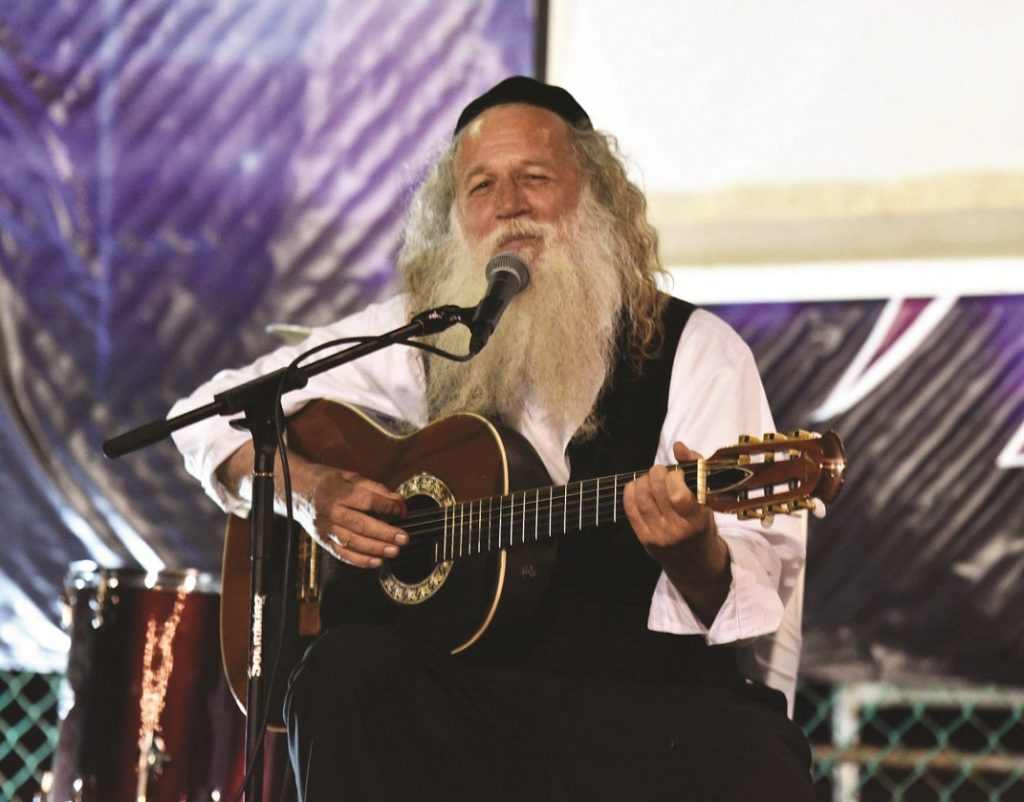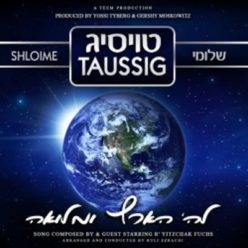Song: “Lashem Ha’aretz (Bum Bum)”
Composer: Yitzchak Fuchs
Album: Shloime Taussig’s Lashem Ha’aretz Umlo’ah
There’s something special about watching Yitzchak Fuchs sing. The tall white-bearded musician swaying over a guitar eyes closed and peyos swinging projects an incredible stage presence his features intense and absorbed. He’s a veteran performer who for decades has been inspiring audiences as varied as his milieus — from chassidic weddings to kumzitzen on Samarian hilltops from Antwerp sheva brachos celebrations to Monsey bar mitzvahs to student concert halls in Tel Aviv. Beyond the uplifting words and fresh style of his compositions it’s obvious just watching him that Fuchs who is also a silversmith is singing his heart and soul out.
His personal journey is expressed through his music. “My parents arrived in Israel from Poland after the war. They came from chassidic families but were so broken that no religion was left. My grandfather was a religious Jew a baal tefillah but his song was lost.
“As a teenager” Fuchs continues “I wanted to sing but I had no words. What was there to sing? And then I turned to Sefer Tehillim.”
At 30 Fuchs who is now 62 found his way to the world of Torah and also to the Holy City of Jerusalem which became his home. “And when I had made that ascent to Yerushalayim I just had to sing a shirah — a song of praise and gratitude to Hashem just like the Jews who crossed the Sea. I began to compose and a new sound emerged — a shirah chadashah.
Unlike secular songs which he says are usually ephemeral passing hits that capture the spirit of their decade if that Fuchs found that the words of Tehillim are timeless. “You can sing and sing. It’s 30 years later and I’m still singing the same songs. My songs have that ta’am shel od. Everywhere I go they ask for the same songs again — ‘Lashem Ha’aretz Umlo’ah ’ of course and ‘Menuchah V’simchah’ and ‘Ben Chamesh Lamikra’ [from the album Mimamakim].” Fuchs has also composed songs for MBD Shloime Gertner and others.
“Lashem Ha’aretz” was composed around 25 years ago and although it’s been popular since Fuchs didn’t include it in any of his own albums . “I took the words from the Shir shel Yom of Sunday. So much of Jewish music is centered around Shabbos but I felt these words had a special energy and called for a song of their own.”
The song begins with a distinctive “Bum bum bum bum bum bum da da da da bum bum bum bum…” which Fuchs describes as a melody of bitachon and joyful assurance. “Lashem ha’aretz… the Earth and its fullness belongs to Hashem…” All is His. The music rises with the question “Mi yaaleh — who will rise on the mountain of Hashem… in His holy place?” and Fuchs stops playing leaving a speculative pause. “Bum Bum Bum Bum” resumes taking the listener back to that place of certainty and joy.
After 18 years living in Meah Shearim Fuchs relocated to Boro Park a move he describes as “galut.” Yet that’s where his musical career really took off and along with it a proliferation of new compositions. American audiences especially the chassidim loved his fresh bold songs and Fuchs performed widely. His song “Boro Park” is a fitting tribute to this period which for all its perks didn’t last long. Three years later Fuchs returned to Eretz Yisrael.
“I know a guy who lives in an outpost — literally a tent — in the Chevron Hills. I went there to visit him in his tent. No electricity no running water no phone nothing. But he still had music. My first album from back in 1985 Banu B’yachad was singing into the wilderness on a little CD player.”
He now lives in Tzfas and travels abroad several times a year to perform at weddings and other venues. Yet wherever he is Fuchs has the intensity of a man who lives in his own musical world. “I once played into the wee hours of the morning at a concert in the US for Reb Shlomo Carlebach’s yahrtzeit. The hours and hours of strumming caused my hand a lot of pain. I flew back to Eretz Yisrael where I had booked a concert on Motzaei Shabbos. But my hand was killing me and I had no idea how I would play. The hall filled and the pain remained. Then I picked up my guitar. I began to play. Mysteriously the pain was gone with the music.”




